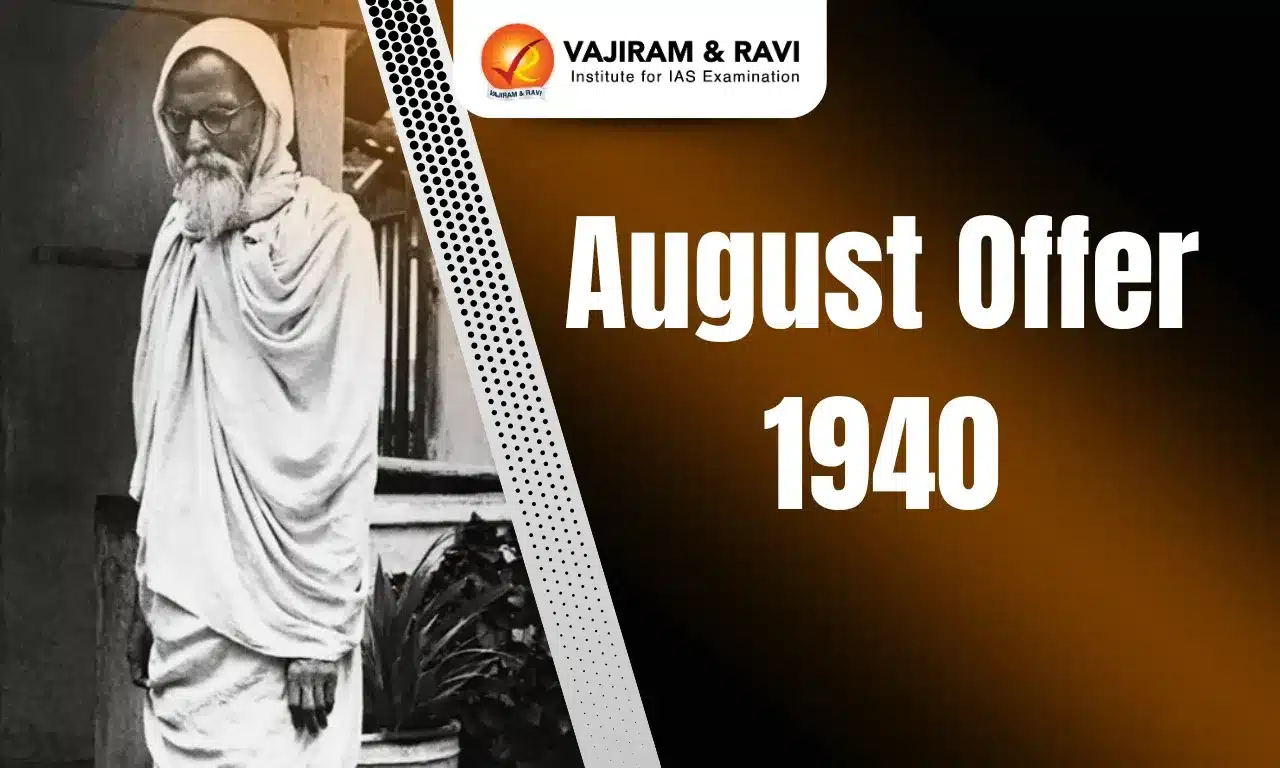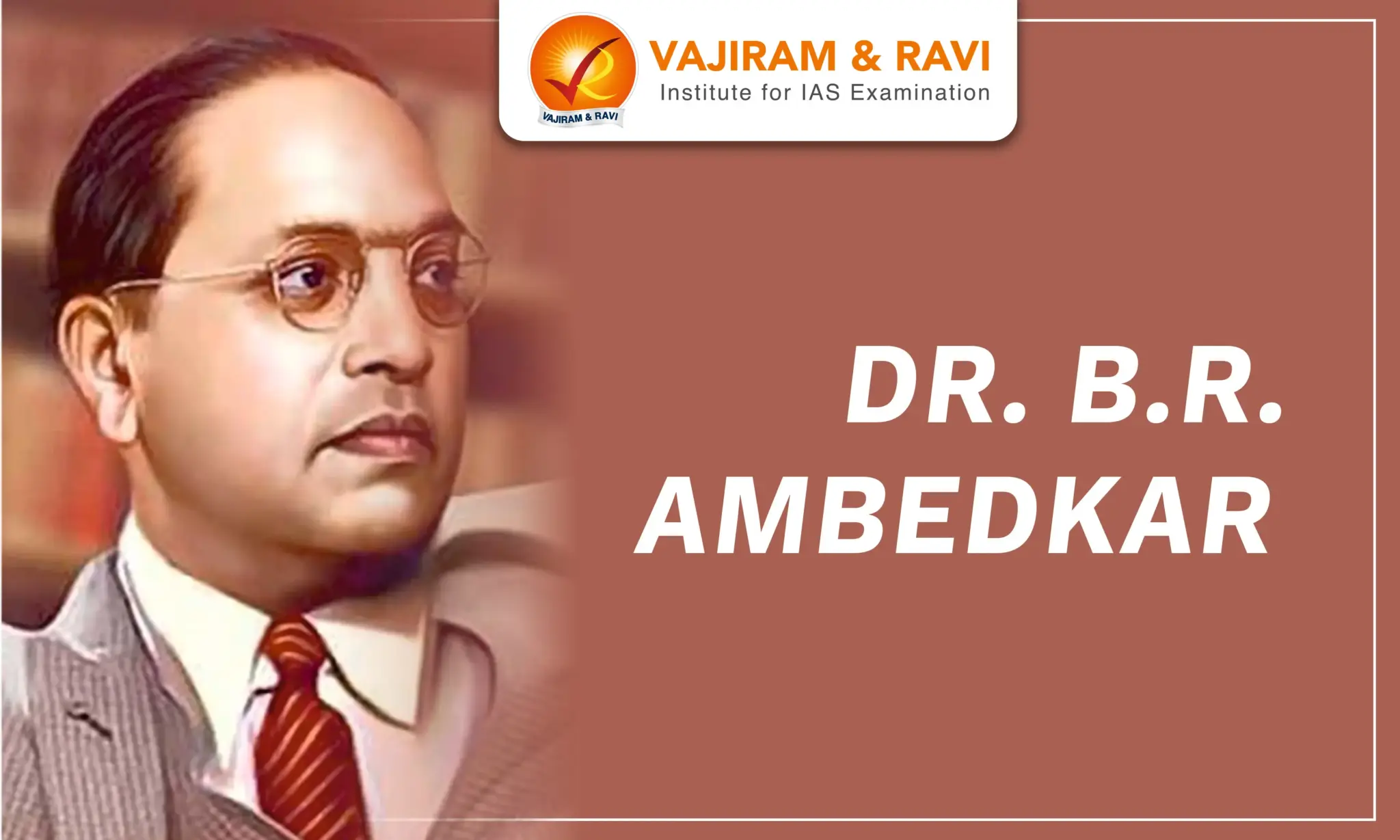August Offer and Individual Satyagraha: The Second World War had far-reaching impacts at the global level as well as in the various colonies in India. The effects of the War on India were being witnessed even at the commencement of the War when Britain, at the behest of Americans, sought Indian support on both active and passive fronts.
This period saw a series of events regarding Indian freedom, British efforts to appease Indians and to endorse Jinnah’s demand for a separate state. August Offer was one of them, which could not appease Indians. The result was the Individual Satyagraha.
Background to the August Offer
The August Offer, proposed in 1940 by Lord Linlithgow, then Viceroy of India, was an attempt to garner Indian support during World War II. The offer was made in response to the British government's criticism in India for forcing Indians to fight in World War II. Both Congress and the League rejected the suggestion. The events leading to the British making such an offer are as follows.
World War II and Indian Response
When World War II broke out in September 1939, India was a colony of the British Empire. Without seeking Indian opinion, the British Government of India declared Indian support for the war. The nationalists had a varied response to this:
- Congress’s position: Congress decided to support the war effort on two conditions – a constituent assembly should be convened to determine the political structure of a free India after the war and the immediate establishment of a responsible government at the centre. However, the government rejected this.
- Gandhi: He supported the war efforts of Britain mainly due to his dislike of the fascist ideology.
- Socialist response: Socialist leaders such as Subhash Bose, Acharya Narendra Dev and Jayaprakash Narayan did not support Britain in the war efforts; instead, they advocated for a civil disobedience movement, seeking the advantage of the situation.
- Jawaharlal Nehru: He neither supported Britain nor in launching the Civil disobedience movement. He argued against Indian participation until India was independent.
Linlithgow’s Statement on October 17, 1939
In order to gain the support of Congress, Linlithgow gave a statement, which included:
- Consultation with representatives of various parties and communities on the modification of the GOI Act of 1935.
- Setting up a consultative committee for further advice.
- However, it did not define any British war aims.
Ramgarh session (March 1940)
Dissatisfied with the government's response, Congress, under the presidency of Maulana Abul Kalam Azad in the Ramgarh Session, took the following decisions:
- To launch the Civil Disobedience Movement at an appropriate time and according to Gandhi
- To reiterate the demand for complete independence
August Offer (1940)
Debacles of the Allied powers in World War II, such as the defeat of France and Germany’s success, put pressure on England to conciliate with Indian leaders. The Congress was also ready to compromise due to the ongoing victories of Nazism. Against this backdrop, the Government, through Viceroy Linlithgow, came up with its own offer called the August Offer.
Features of the August Offer
The August Offer was an attempt to secure Indian support for the British war effort by offering some concessions on the issue of Indian self-government. The main features of the August Offer are:
- Representative Body: It was promised that the British Government would introduce a representative constituent body, consisting mainly of Indians, to frame India's new Constitution.
- The post-war constituent assembly would decide the subject matters of the Constitution in accordance with their social, political and economic requirements.
- Dominion Status with participation by Indians:
- It repeated the promise of dominion status after victory in the war.
- It promised to set up a War Advisory Council with the participation of Indians.
- It promised the expansion of the viceroy’s executive council with a majority of Indians.
- However, The Viceroy retained a monopoly in defence, treaties with States, minority rights, and all-India services.
- Veto to League: It promised that no future constitution is to be adopted without the consent of minorities.
Response to the August Offer
The August Offer faced strong opposition from various sections of Indian society, including the Indian National Congress and the Muslim League, for different reasons.
- Congress: Congress rejected the August offer, as it insisted on complete independence instead of dominion status.
- Muslim League: The Muslim League also rejected the August offer, as it was now beginning to demand a separate state of Pakistan.
- Mahatma Gandhi: In response to the offer, Mahatma Gandhi called for the Individual Satyagraha.
Evaluation of the August Offer
In the history of Indian independence, the August Offer was a crucial development. It demonstrated the British government's willingness to give the INC some leniency, but it also demonstrated the INC's unwillingness to relinquish its demands for independence.
- For the first time, the Congress's request for a constituent assembly was granted, and the inherent right of Indians to draft their own constitution was acknowledged.
- For the first time, it was explicitly offered to be a dominion.
- The viceroy's executive council was expanded in July 1941, giving the Indians their first majority of 8 out of 12 members.
Individual Satyagraha
Although Gandhi, in principle, was opposed to Indian participation in the world war, he waited for a more acceptable offer from the British. However, the August Offer made Gandhi and Congress members frustrated. Against this backdrop, he made the decision to organise a small-scale Individual Satyagraha in each locality, led by a few carefully chosen individuals.
Timeline of Individual Satyagraha and Satyagrahis:
- On October 17, 1940, Vinobha Bhave began the Satyagraha movement near his Paunar ashram in Maharashtra. Jawaharlal Nehru followed him soon.
- Brahma Dutt was the third satyagrahi.
- Gandhi called a halt to the Satyagraha in December 1941.
- In January 1941, it was revived with some changes, and groups offered satyagrahas, and it was eventually withdrawn in August 1941.
Aim of the Individual Satyagraha:
- It was started mainly to protest peacefully against the war, express people’s feelings and give another opportunity to the government to accept Congress’ demands peacefully.
Features of Individual Satyagraha
The Individual Satyagraha which was started as a response to the August Offer has the following features:
- Gandhi chose an individual Satyagraha strategy to ensure that the fight against fascism was not hampered, unlike in the past when his campaign had taken on a mass character. Gandhi handpicked the satyagrahis, and their demands were limited to claiming their freedom of speech in order to preach against war participation.
- It was mainly based on the principle of freedom of speech, not on the principle of non-violence in the circumstances of the war.
- It was to be a controlled ‘individual satyagraha’ because non-Congress members could not offer it, and it was left to Mahatma Gandhi to choose the Satyagrahis.
Evaluation of the Individual Satyagraha
By October 1941, the campaign had lost its initial impetus, and only about 5,600 Satyagrahis had remained in jail.
- Individual Satyagraha was relatively successful in the United Provinces. In western India, prominent leaders such as Vinoba Bhave were arrested and imprisoned in October 1940.
- It failed to impress the popular masses everywhere.
- In addition to Gandhi's own restrictions on the campaign, the provincial Congress governments' meagre land reforms implemented before their resignation either suppressed or assuaged the agitational potential that existed in regions like Bihar and the United Provinces in the late 1930s.
- It did not completely jeopardise the war effort, nor did it bring the two sides – the imperial government and the Congress onto the negotiating table.
- Despite the Individual Satyagraha campaign's limited success, a number of marginalised and relatively unnoticed people joined the movement to voice their opposition to regional excesses.
Last updated on November, 2025
→ Check out the latest UPSC Syllabus 2026 here.
→ Join Vajiram & Ravi’s Interview Guidance Programme for expert help to crack your final UPSC stage.
→ UPSC Mains Result 2025 is now out.
→ UPSC Notification 2026 is scheduled to be released on January 14, 2026.
→ UPSC Calendar 2026 is released on 15th May, 2025.
→ The UPSC Vacancy 2025 were released 1129, out of which 979 were for UPSC CSE and remaining 150 are for UPSC IFoS.
→ UPSC Prelims 2026 will be conducted on 24th May, 2026 & UPSC Mains 2026 will be conducted on 21st August 2026.
→ The UPSC Selection Process is of 3 stages-Prelims, Mains and Interview.
→ UPSC Result 2024 is released with latest UPSC Marksheet 2024. Check Now!
→ UPSC Prelims Result 2025 is out now for the CSE held on 25 May 2025.
→ UPSC Toppers List 2024 is released now. Shakti Dubey is UPSC AIR 1 2024 Topper.
→ UPSC Prelims Question Paper 2025 and Unofficial Prelims Answer Key 2025 are available now.
→ UPSC Mains Question Paper 2025 is out for Essay, GS 1, 2, 3 & GS 4.
→ UPSC Mains Indian Language Question Paper 2025 is now out.
→ UPSC Mains Optional Question Paper 2025 is now out.
→ Also check Best IAS Coaching in Delhi
Tags: august offer 1940 quest

















